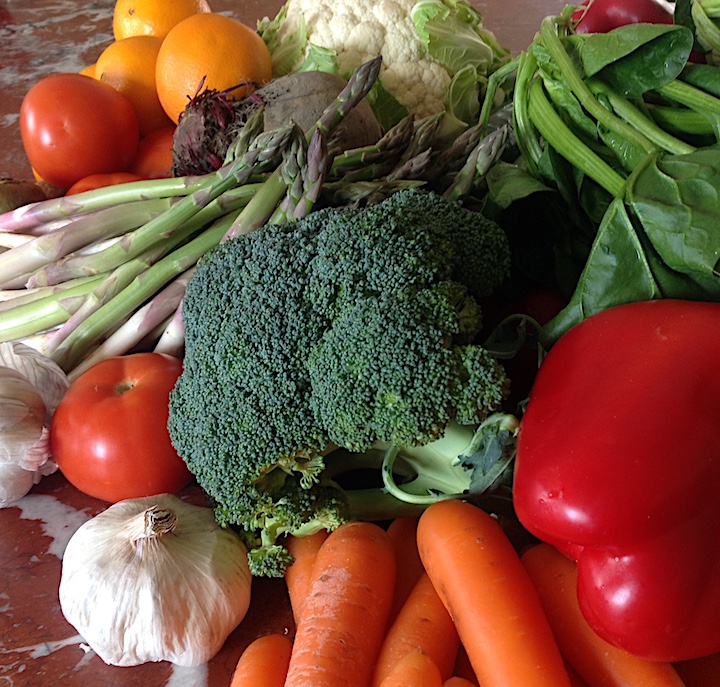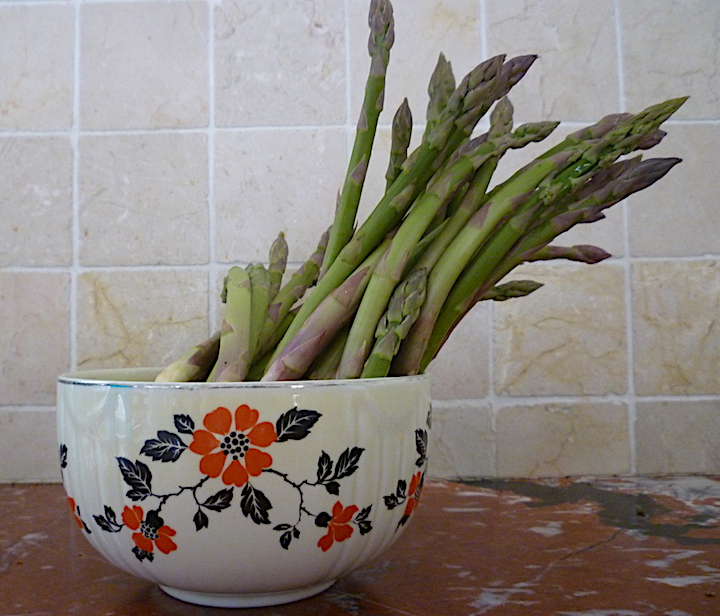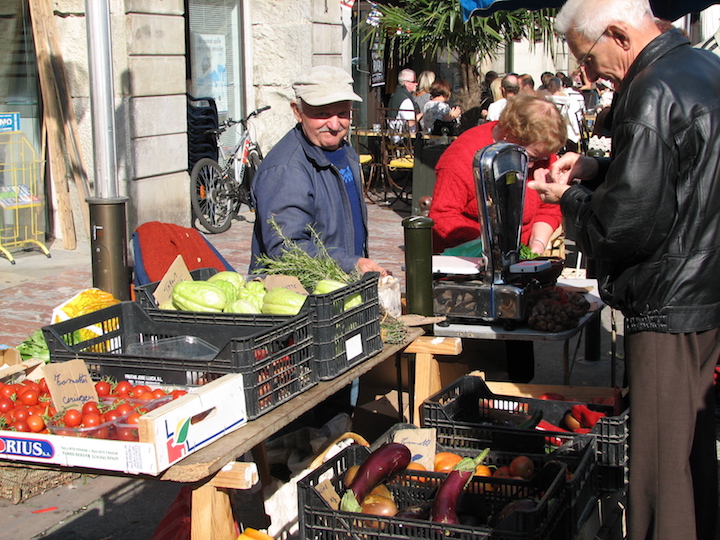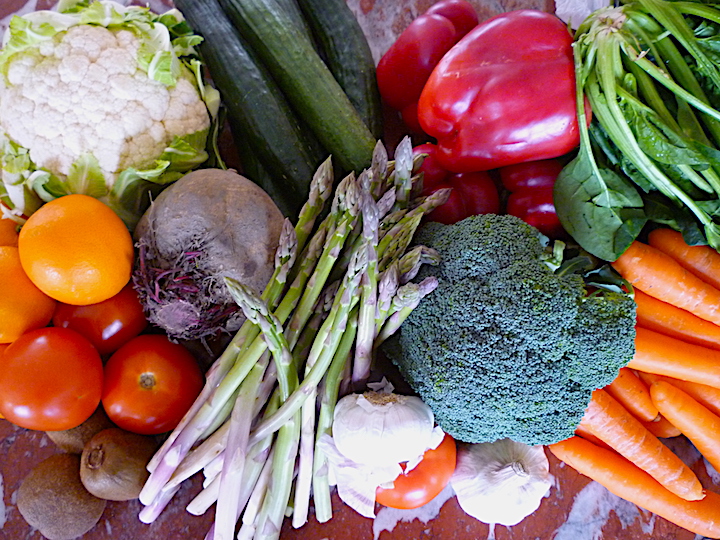 Living in France has changed my cooking and eating habits. Sure, the French have amazing packaged, ready-to-eat foods lining the aisles of the hypermarchés. And somebody is buying all that stuff–according to the Ministry of Agriculture, the French in 2010 (latest figures) spent 53 minutes a day preparing meals, vs. 71 minutes a day in 1986, while le snacking (seriously, they used that term) increased almost 11% between 2014 and 2015.
Living in France has changed my cooking and eating habits. Sure, the French have amazing packaged, ready-to-eat foods lining the aisles of the hypermarchés. And somebody is buying all that stuff–according to the Ministry of Agriculture, the French in 2010 (latest figures) spent 53 minutes a day preparing meals, vs. 71 minutes a day in 1986, while le snacking (seriously, they used that term) increased almost 11% between 2014 and 2015.
Our kid has remarked on the predominance of ready-made dishes at friends’ homes. Admittedly, it’s challenging to whip up a meal from scratch in under half an hour. Challenging but not impossible. It requires planning, and if your bandwidth is taken up by things like work, then maybe home cooking is a thought too much.
On the other hand, cooking from scratch doesn’t always take that much more time than using prepared packages. Cakes and moelleux au chocolat (aka brownies) are a prime example. And cooking from scratch is cheaper and healthier. Years ago, I took a guided hiking tour in Morocco with Nouvelles Frontières. I was the only non-French person. Our equipment and food traveled separately from us, on donkey-back, with tents set up and meals ready when we’d arrive at the next campsite. We sat cross-legged in a circle on the ground, and the cook would serve up the first course, always soup. We’d pass the bowls around until everyone had one, then would taste. One day I was at the far end, and got my bowl of soup first. I did what I’d seen the others do each day: I drew in a long breath over my bowl, then reflected aloud, “Quelles épices?”(which spices), which drew much laughter. The composition of every dish was the launching point of every dinnertime conversation, branching out from minute analysis of the spices to the ingredients and methods of preparation, and sometimes spinning into arguments about which region of France had the best butter or whether one region’s salt was superior to another’s. I had never heard so much intense discussion and debate about food. Every. Single. Day.
Years ago, I took a guided hiking tour in Morocco with Nouvelles Frontières. I was the only non-French person. Our equipment and food traveled separately from us, on donkey-back, with tents set up and meals ready when we’d arrive at the next campsite. We sat cross-legged in a circle on the ground, and the cook would serve up the first course, always soup. We’d pass the bowls around until everyone had one, then would taste. One day I was at the far end, and got my bowl of soup first. I did what I’d seen the others do each day: I drew in a long breath over my bowl, then reflected aloud, “Quelles épices?”(which spices), which drew much laughter. The composition of every dish was the launching point of every dinnertime conversation, branching out from minute analysis of the spices to the ingredients and methods of preparation, and sometimes spinning into arguments about which region of France had the best butter or whether one region’s salt was superior to another’s. I had never heard so much intense discussion and debate about food. Every. Single. Day.
I loved it.
Our kid has absorbed this French obsession about food and is a talented and opinionated cook, declaring the other day, “When I have my own place, I’ll know I’ve succeeded if nothing I buy has labels.” Think about it–vegetables from farmers; cheese from cheesemongers or cheesemakers; bread from the baker; meat from the butcher, trimmed before your eyes; fish with the head still on from the fishmonger (OK, I will skip that one. I can’t eat anything that looks at me). We already mostly eat that way, except the fancy cheese is a special treat, not a regular habit. Even milk can come without packaging.

Much of our produce comes from local farmers, but we do buy some imports–oranges, pineapples, off-season vegetables….I just read that the U.S. imports 53% of fresh fruit and 31% of fresh vegetables. The figures for France are similar: 40% of fruits and vegetables are imported, notably produce that doesn’t grow here, such as bananas and avocados. However, the French article notes that domestic production has dropped. I do wonder about that, with all the housing developments and shopping centers taking over prime farmland. Once paved over, it will produce food no more.


We’re on the no label quest too. It’s more work, but definitely worthwhile 🙂
LikeLiked by 1 person
Goals, eh?
It’s only marginally more work. It’s the planning that’s most important.
LikeLiked by 1 person
Btw, I was in your area yesterday and the flowers were just stunning. The entire landscape was wonderful. It was a horrendous day, but at least in a very beautiful place 🙂
LikeLiked by 1 person
Sorry the day was horrendous!
LikeLiked by 1 person
Through no fault of Carcassonne!!!
LikeLiked by 1 person
On a positive note it is exciting to see how popular farmers markets have become all over the States. When I grew up we did not really have the option, but now the push is to buy local and reduce your “foods” carbon footprint. We also enjoy eating local cheeses 🙂
LikeLiked by 2 people
Yes! Though farmers markets are more expensive than supermarkets. Here, it’s the opposite–the farm stands are cheaper. I have read that imports can have a lower carbon footprint because the transport is so much more efficient even if it’s farther. However, that isn’t all of it. I know that skinflint local farmers aren’t going to use a drop of fertilizer or pesticide if they don’t absolutely need to.
LikeLike
Part of the reason food production, particularly veggies, has decreased is because the subsidies favour the big cereal farms. The subsidies are a really blunt tool, the more land the more money you get. Little sustainably run market gardeners get virtually nothing, and even big market gardens are nowhere near the size of a wheat farm. A related issue is that the subsidies are supposed to compensate farmers for managing the land and keep food prices low enough to be affordable. Unfortunately what they actually do is allow cereal farmers to spray with a cocktail of fungicides, insecticides, herbicides and fertilizer on average 18 times over the lifetime of the crop (plus it might be treated in storage too). All that excess goes into the environment. Whereas market gardeners tend to be much more circumspect because their product is less processed when the consumer gets it and consumers are asking about this stuff now.
LikeLiked by 3 people
That’s a good point about subsidies. I read in one of the links that production of nectarines had dropped sharply even as consumption has risen.
LikeLike
Thanks for bringing that up! I think that subsidies distort the market and the financial benefit is not necessarily for the many – especially when you consider that it’s the taxpayers’ money that is being used to “keep food prices low enough to be affordable”. I know it’s a simplistic view, but if people would be allowed to keep that money in the first place, perhaps they’d be able to afford to pay a little more for their food? And let’s not even think about the Chinese buying large tracts of French farmland…
LikeLiked by 1 person
I have lived almost entirely label free for many years. Did it in the UK, managed it in the US much better than people might imagine is possible in Massachusetts and do it here. The only labels I am happy to allow are wine labels but when we settle in a growing area which we are determined to do (and make our own) that too should go. The eating of food from as close to the land that I walk on as possible has been my driver and it is heartening to read about young people like yours embracing the trend and understanding how much better it is for you and how much better it tastes when the food is really fresh and wasn’t ripened in transit whilst creating it’s own hefty carbon footprint!
LikeLiked by 1 person
Unfortunately, it is often more expensive–the butcher costs more than the supermarket, certainly the artisanal cheeses are far pricier than the industrial ones. Quality has to come before quantity.
LikeLiked by 1 person
As you may know my family had a Cheese Shop in Britain for several decades, my then husband was heard to remark to a customer (diplomacy is not one of his skills) ‘the key is to eat less of it’ when they remarked that buying artisanal products is pricey – I have to say, I concur!! Seriously, it is far more difficult with a young family and I don’t judge those that can’t afford any other way but it would be wonderful to think that we could start and sustain a revolution that takes us backwards to a time when we bought locally and didn’t crave avocados and kafir limes when we live in, for example, Oxford!
LikeLiked by 1 person
OTOH, those avocado eaters are probably just trying to buy what’s healthy.
LikeLiked by 1 person
My pont is that they are not healthy to the environment when you view those little green beauties carbon footprint 👣
LikeLike
PS: I should own up that Avos are my singular guilty pleasure and the exception that prove my rule 😂
LikeLiked by 1 person
I have been trying to plan better. I try to think in two or three meals at a time. Like the top of the leek makes stock and the white gets sliced in coins roasted along with cherry tomatoes for a bed for fish, or add mushrooms and makes good pizza. That way it is not so much work. I am not saying I have it down all the time, but it is getting easier.
LikeLiked by 2 people
Yup. I started making soup with the stalks immediately after the market–broccoli, cauliflower and leek greens go well together–and that way I don’t have to do it later and I don’t waste either.
We had pizza last night, completely from scratch. It doesn’t take that much active work, but it does require foresight/ability to be at home for a few hours while the dough rises.
LikeLike
I feel like it will take at least a generation for the American diet to improve, and it will need to start in schools with education and gardens in the schools that the students plant and manage and then get to cook and eat. It is a radical shift and I wonder if the large food corporations will lobby against, but unless we change our diet radically the life span and health of Americans in general will continue to decline.
LikeLiked by 2 people
What an interesting thought Ingrid (love your name by the way). That’s exactly what I’d like to see happen starting in middle schools and let them manage the garden. Make spaghetti sauce from scratch and many other dishes. The emphasis being put on fruits and vegetables which is losing popularity. My son is 13 and isn’t crazy about vegetables and he says the school meals vegetables are not good at all. Maybe if he helped grow them and prepare them he’d like them more.
Again, what a great idea. I’m gonna get in someone’s ear with this idea.
LikeLiked by 1 person
Good luck! I wish you much success!
LikeLiked by 1 person
I agree there’s a lot schools can do, but we can’t just expect schools to do everything, especially when teachers are paid a pittance. Community projects would be another option, though there need to be many, overlapping solutions.
LikeLike
I agree the schools can’t be expected to do it all. In more affluent communities, it probably wouldn’t be that difficult to implement. However, I’m thinking more in terms of those communities in crisis where due to drugs or poverty (or both), the families are no longer effective in raising and teaching their children. It would take a more community focused approach, as well as an influx of funds and attention (which, sadly, our current attitude toward public education will not likely support) for the schools to take a larger role. But then again, that’s a whole other nest of problems. Sorry about getting up on the soapbox.
LikeLike
It’s best to buy local. Even though I don’t really cook for myself, I do raid the farmer market each week, and tend to prefer the local deli to the supermarket.
LikeLiked by 1 person
You can always eat raw!
LikeLike
Yesterday I had lunch in a restaurant in Monbazillac. The meal itself was quite good, but the big taste surprise was the lettuce in the small salad served with the cheese course, which had a wonderful, earthy flavor, and was obviously very fresh. As an American now living here in France for two plus years, I am frequently amazed at how wonderful the flavors of the food are here. Sadly food in the US has lost flavor, with the exception of produce available at farmer’s markets.
LikeLiked by 1 person
I did something recently about the French obsession with freshness–like endives taken for sale at the market, still growing in dirt. And even the stuff that’s been pulled, usually still has dirt (and even bugs and slugs) on it. Because it’s natural. Overcleaning it in advance just makes it spoil faster.
LikeLike
Our high school on the island has a garden. The students harvest the food for the cafeteria. They also have a food cart set up to sell soup and salads…just simple things. Some of the students go on to culinary schools, or in the hospitality industry. It’s a brilliant idea.
Ali
LikeLiked by 1 person
There’s a high school like that here, for kids who want to go into agriculture, culinary arts or hospitality.
LikeLike
The growth of the CSA movement (Community Supported Agriculture, where you buy a share in the harvest at the beginning of the growing season and thus give the small farmer some financial stability) has helped a lot of small farmers stay in business in the US, especially in the northeast, where the soil isn’t the best.
I knew someone whose rule of thumb was not to consume any food grown farther than 50 miles away. You can do it, with some thought and planning.
And absolutely agree with Godfrey that US food, even organics, is sadly lacking in taste and flavor. When I was in France a month or so ago, my little taste buds all jumped up and cheered.
LikeLiked by 1 person
I think the taste has to do with the “more than 50 miles” part–something picked in the night before or even the same morning it’s sold is going to have ripened on the plant and have more flavor.
LikeLike
I love being able to pick just the right size of vegetable for whatever I’m planning to cook. Large of small onions, potatoes, carrots, apples, etc.! The supermarkets have uniform vegetables, which seem to keep forever. I’ve not bought any packaged vegetables in absolute ages, and most of my shopping is done in our twice weekly farmers market – it’s one of the many reasons I live in this wonderful spot!
LikeLiked by 1 person
Or to have the choice of size, at least.
LikeLiked by 1 person
As many people do, I shop the outside aisles here in the states – staying away from the prepackaged foods in the center aisles. But nothing compares to the markets in France. Lovely article!
LikeLiked by 1 person
That is definitely the smart strategy.
LikeLiked by 1 person
Such pretty pictures! We do okay with unpackaged fruits and vegetables, there is a small regional chain that is more market and less super, but not as well with dairy and meat. For the amount of agriculture that goes on around here the non-supermarket access is pretty limited. The farmer’s market that was close has ceased operation, the next closest is really more of a food truck rally these days. There are local family farms that drop off to individual customers at the restaurants they supply who offer pastured meat and eggs, and the occasional artisanal cheese, but mostly you have to drive half way to Austin to get anything interesting. I am glad that our large local chain tends to source from Texas growers, anyway, and has done a good job creating a respectable presentation of organic produce. With imported butter and good cheese, and a supply of venison and pastured pork harvested by friends we certainly can’t complain.
I agree with the “just eat less” sentiment – really, if the quality is very high, satiety tends to be high as well, and I find that I/we really don’t need as much quantity. Eggs for example – the five of us regularly consume a dozen eggs a day, if they’re the grocery store variety, but getting them from the local feed store or farm cuts it back to two or even one per person and everyone is quite happy. They’re just better.
LikeLiked by 1 person
This is interesting. I think we waste less when we choose quality over quantity. Food waste is unbelievably huge, and it isn’t just the food itself but the water, fuel, fertilizer and transport that went into it.
LikeLike
Love your son’s comment about ‘no labels’. Living in the mountains of North Carolina, my girls were in elementary school, they were required to bring in labels from recent dinners. We had none as I would freeze and preserve veggies for the rare times fresh was not available. And, yes, I was very proud of myself. Now, years later in Ohio, I admit I am a tad more lax, but freezing and preserving the summer’s bounty is still a given. Good lesson for the younger.
LikeLiked by 1 person
Yes, it’s good, but it’s also a luxury, requiring time and/or money. My grandma’s garden fed two families, but it was a full-time job for her (though she loved it).
LikeLike